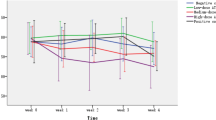Abstract
AKR mice, which have a short mean survival time and usually die with leukaemia, were studied from one month of age for correlation between these two parameters. For untreated animals we found the same mean survival time whether or not leukaemia occurred. By treating sucklings with the polycations diethylaminoethyl-dextran or hexadimethrine bromide the leukaemia incidence was significantly reduced. However, the mean survival time was unchanged, and remained the same in leukaemic and non-leukaemic animals. It is therefore suggested that the early death of AKR mice results from an ageing process and does not require leukaemia for implementation. Our prophylactic polycation treatment was furthermore found to induce spleen amyloid in some but not all of the mice that remained non-leukaemic.
Similar content being viewed by others
Rights and permissions
About this article
Cite this article
Ebbesen, P. Life span, leukaemia and amyloid incidences of untreated and polycation-treated AKR mice. Br J Cancer 37, 76–80 (1978). https://doi.org/10.1038/bjc.1978.11
Issue Date:
DOI: https://doi.org/10.1038/bjc.1978.11
- Springer Nature Limited




